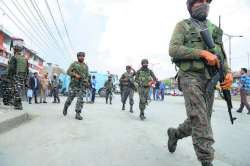Security forces maintain control in J&K as Pakistan attempts to disturb peace
Despite Pakistans desperate attempts to fuel trouble in Jammu and Kashmir, security forces have maintained dominance on the situation there ever since the states special status was abolished about 40 days back.

Despite Pakistans desperate attempts to fuel trouble in Jammu and Kashmir, security forces have maintained dominance on the situation there ever since the states special status was abolished about 40 days back.
Except for sporadic terror attacks targeting civilians and some stone pelting incidents, the Kashmir Valley has been peaceful, according to the Jammu and Kashmir administration and the Army.
On August 6, Parliament approved abolition of the special status of Jammu and Kashmir, granted under Article 370 of the Indian Constitution, and bifurcated the state into two Union Territories – Jammu and Kashmir Union Territory with a legislature and Ladakh Union Territory without a legislature.
In apprehension of trouble because of the Centre's historic step, Jammu and Kashmir was placed under unprecedented security cover, involving deployment of about 28,000 additional personnel of central paramilitary forces.
The restrictions have since been eased to a significant extent but the security forces have not allowed any major incident to disrupt peace despite attempts.
The Jammu and Kashmir police on September 12 foiled possibly a major terror attack when it intercepted a truck on the basis of a specific input and recovered a large quantity of arms and ammunition, including 6 AK assault rifles, six magazines and 180 bullets.
The truck was on its way from Pathankot in Punjab to Kashmir Valley when it was intercepted in Kathua area of Jammu region.
The police also arrested three activists of Pakistan-based Jaish-e-Mohammad (JeM) who were travelling in the truck. JeM was the terror group that carried out the ghastly suicide bomb attack on a CRPF convoy on the Jammu-Srinagar National Highway in Pulwama district of Kashmir on February 14, killing 40 personnel of the force.
There have been five civilian deaths during this period, either in terror attack or in stone-pelting incidents, according to the J&K administration and the Army.
In the third week of August, two nomads belonging to the Bakarwal community, Abdul Qadir Kohli and Manzoor Ahmad Kohli, were abducted and killed by the terrorists.
A 42-year-old lorry driver, Noor Mohammed Dar, was killed by stone pelters in Anantnag on August 25. On August 29, terrorists killed a shopkeeper Ghulam Mohammed (65) in Parimpora, Srinagar.
Another civilian, Asrar Ahmad Khan, was injured in stone-pelting on August 6. He was hospitalized and succumbed to injuries on September 4. An apple trader's family was targeted by terrorists in Sopore in Kashmir, leaving four of its members, including a minor girl, injured.
Within days, security forces killed Lashkar-e-Taiba (LeT) terrorist Asif Maqbool Bhat in an encounter on September 11, saying he was responsible for the attack on the trader's family.
The encounter took place two days after the Jammu and Kashmir Police, along with the Army and other security forces, arrested eight LeT terrorists from the Sopore region, busting a module of the Pakistan-based terror outfit.
Even though violence in the hinterland of Jammu and Kashmir has been contained, there is military escalation on the Line of Control (LoC) because of the surge in ceasefire violations by Pakistan and its attempts to push in terrorists.
As per the data available till August 30, there were 222 ceasefire violations since the special status of Jammu and Kashmir was withdrawn. Prior to this, the highest number of ceasefire violations (296) was recorded in the month of July. According to security agencies, the ceasefire violations by Pakistan are mostly intended to give cover fire to the terrorists infiltrating into India.